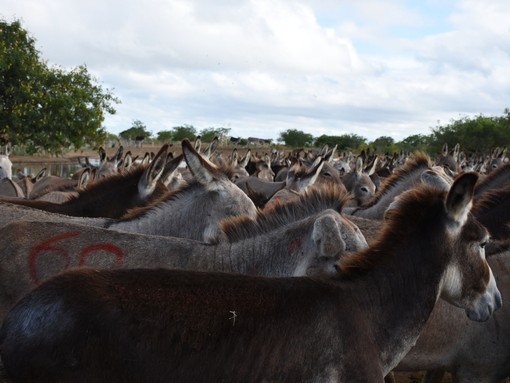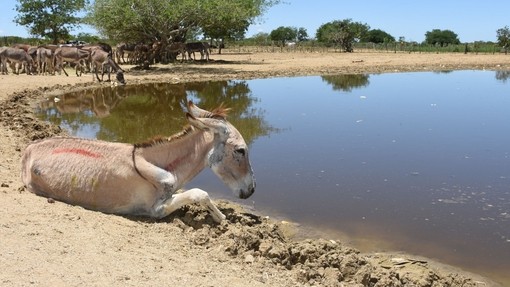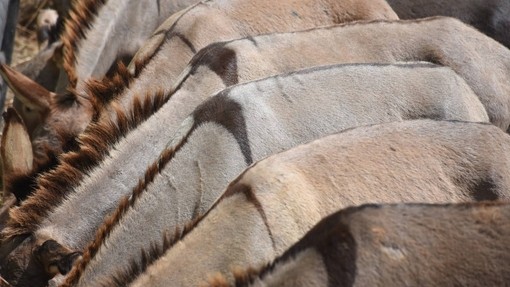
Do not change or delete this
In a remote corner of Brazil, 700 donkeys had been corralled into a pen together with no food and only a stagnant water source to drink from.
Police officers who investigated the scene reported that the donkeys were in a terrible condition, and many were suffering. Hundreds had already perished – their carcasses lay rotting in the pen where the other donkeys were still trying to desperately forage for food.
Destined for slaughter
The donkeys discovered were on their way to be slaughtered for their skins, which are used to produce a traditional Chinese medicine called ‘Ejiao’. This practice is banned in Brazil, meaning that the slaughterhouses, which were open until late 2018, are now shut down. Illegal traders, in the absence of these slaughterhouses, are now resorting to dumping hundreds of animals in holding pens in the hope that the ban will be dropped.
The donkeys would have been travelling huge distances over many days, in stifling heat and cramped trucks, before arriving at the vastly overcrowded farm. We were made aware of their plight by Brazilian organisation Fórum Nacional de Proteção e Defesa Animal (Forum Animal), who were given guardianship of the donkeys by the courts. We immediately dispatched two teams from The Donkey Sanctuary in Mexico and the UK, as well as recruiting a team of staff from Brazil including vets and a welfare and advocacy adviser.
A poor prognosis
When our teams arrived at the site in Bahia, North-East Brazil, the scene at the farm was as we had feared. Most of the donkeys were underweight, some severely malnourished and very weak. Carcasses littered the ground and vultures constantly circled the group. The donkeys were struggling to survive in the overcrowded pen, with natural food sources exhausted and their only water supply polluted by the rotting bodies of donkeys that had died there.
The original report stated that 700 donkeys were being kept at the farm - not including approximately 200 who had already died - but within weeks, 700 had declined to 400.
The main reason for such a high number of deaths was due to hyperlipaemia – a potentially fatal condition that donkeys are prone to, which is often triggered by stress or malnutrition.
Eduardo Santurtun, The Donkey Sanctuary’s regional director for the Americas, says: “These donkeys have many different challenges they need to face, all of which result in stress. Unfortunately, this is a real example of how stress can cause animals to die.”
Help against the odds
Given the odds stacking against the poor donkeys, our teams have worked hard to improve their conditions. They assessed the condition of each donkey, administering immediate veterinary treatment where necessary. Hay was distributed to them twice a day, and a new water trough was installed near the entrance to the pen to provide them with access to clean, fresh water.
The team carried out twice-daily scans of the perimeters of the pen, and would often find donkeys that were too weak to get up – even for food and water. If their prognosis was very poor or their health failed to improve despite treatment, our vets would sometimes agree that donkeys should be put to sleep to spare them even further suffering.
Aline Rocha, a vet from the team in Brazil, said: “We’d see the same scenario all the time, donkeys were too weak and were dying. It was so sad.”
The team pressed on, for the sake of the other donkeys and improving their lives. The team’s swift veterinary interventions, and focus on improving the donkeys’ living conditions and access to food and water, led to more successes. Gradually the number of deaths each day reduced.
An unexpected friend in Amiguinho
From the reports we had received, it was assumed that most of the donkeys who were brought to the farm were feral donkeys, rounded up and transported ready for slaughter.
However, there were some who were very friendly, and seemed to enjoy human company. These donkeys would always make themselves known to the team - hovering around whenever they were treating other donkeys, in the hope of receiving some attention in the form of a nice scratch behind the ear or a freshly picked fruit from high-up on the umbu trees.
Amiguinho (which translates to ‘little friend’) was one of these friendly donkeys, and the team grew quite fond of him. In between all the hard work, and during some of the tougher times, Amiguinho was always there, ready to receive some affection and to offer a bit of moral support in return.
Aline remarked on how donkeys like Amiguinho serve as a reminder of the importance of their work, even when events appear to take a turn for the worse: “We want to save all of the donkeys, but sometimes, we can’t. We need to continue to try and help more and more. We want to save the others – like our friend Amiguinho.”
The future for the donkeys
In spite of our best efforts, the future is still uncertain for this herd of donkeys. While our team on the ground is focusses on the veterinary care these animals so desperately need, we are collaborating with Forum Animal to develop a three-month management plan, before drawing up an outline of what the long-term prospects are.
What can be said for sure is that these donkeys are in a much better position now that we have intervened. Their welfare conditions and the overall health of the group continues to improve with each day.
It is only thanks to your support that we can be on hand to deliver expert advice and veterinary intervention in response to distressing situations like this, and we will keep you updated as the situation develops.
Your support can help donkeys affected by the skin trade
Share this page
Tags
- News









